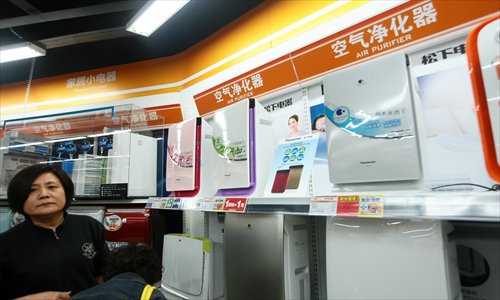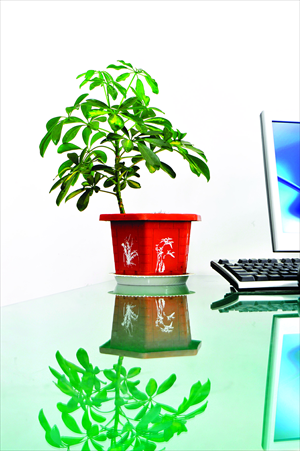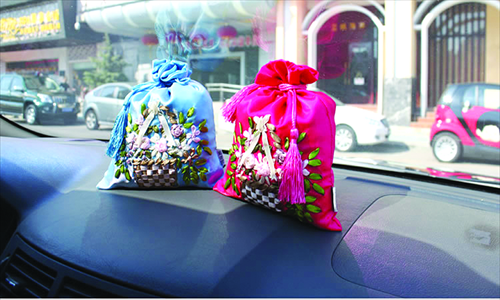Stalker smog




On Monday, Metro Beijing reported on the severe air pollution that has enveloped the capital for days, and that experts are advising Beijingers to stay inside.
But how much safer is our indoor air? Is your office's venting system harming your lungs? How bad is it?
The US Environmental Protection Agency's research shows that 24 million people in the world die every year as a result of poor indoor air quality, said Song Guangsheng, secretary general of China's Indoor Environment Test Center (CIETC).
Song said many factors contribute to bad indoor air quality - chemical contaminants, such as formaldehyde from interior decoration materials, biological pollutants such as germs and bacteria, and physical impurities floating in the air, such as PM2.5 particles.
For those who still have faith in Beijing despite all the heavy traffic, killer cold and poisonous air, here are some practical tips for improving indoor air quality. Save your lungs from the air you do have control over.
1. Buy air purifiers.
Keywords: High-tech, high cost
At Monday's press conference, the Beijing Municipal Environmental Protection Bureau experts declared, "There is no need to purchase indoor air purifiers." But few trust those experts, as evidenced by the recent boom in sales of air purifiers and particle-proof masks.
A customer service representative from Philips Electronics surnamed Xu told Metro Beijing that these days they are selling more than 1,000 purifiers a week online.
"The purifiers are effective," Song said. According to Song, there are two main functions of the purifiers - absorbing PM2.5 and sterilizing. Many machines on the market can do both. They can be purchased in electronics stores, such as Suning or Gome, or ordered online from popular net merchants such as taobao.com, 360buy.com or Newegg.com.
"The first thing to do is to check out the machine's functions and coverage area, and then choose according to your needs," Song advised.
Purifiers don't come cheap. The price range is between thousands of yuan to tens of thousands. If working with a limited budget, consider buying a small, handy and much cheaper device that claims to purify air. Although much less effective than the higher-end models, these will only cost tens or hundreds of yuan.
Reminder: Purifiers must be regularly cleaned to function as promised. Old filters should be changed routinely, according to CIETC's indoor air pollution prevention and control alert released Monday. CIETC also recommended using a purifier and a humidifier at the same time.
2. Lay out activated charcoal products.
Keywords: Location, location, location
Activated charcoal products are widely acknowledged to be good at absorbing benzene, formaldehyde, ammonia and other harmful elements in the air, as well as bad smells, too.
There are many types and sizes of charcoal packs on the market. Usually, recommended spots for placing them, such as on shelves, in drawers or on the floor, are printed on the packages. Choose according to your needs.
Reminder: After a while, take the packs out and expose them to sunlight for a few hours to reactivate the charcoals.
3. Grow plants.
Keywords: Big and leafy
You can't get much more natural than with plants. According to CIETC, green plants are great at reducing floating dust in the air. About 62 percent of the particles that can be inhaled are absorbed during photosynthesis.
Of course, your plants can also tell you how healthy your indoor air is. Dead or yellow leaves are not a good sign.
"Choose big plants with big leaves," said Song.
Reminder: Chemical fragrances can cover up smells and create the illusion of fresh air, but they are not good for your health. Fresh flowers and bowls of fruit are smarter ways to freshen up your living or working space.
4. Open windows.
Keyword: Timing
To open the windows or not - that's the dilemma facing many these gray, smoggy days. You want to keep the pollution out in the first place, but indoor air can become filthy and stagnant without circulation.
Song warned against opening windows during the highest polluted times of day, especially the early morning. Hours with more sunshine are recommended, and Song suggested keeping the windows open for one or two hours.
Reminder: Keep an eye on the air quality reports, and decide when to open the windows accordingly.
5. Food helps.
Keywords: Red and black
Although many disagree with the idea that certain foods can offset the effects of pollution, traditional Chinese medicine teaches that vegetables in the color of black can nourish blood vessels, and red foods can help cleanse the lungs. Therefore, indulge in black fungus, black beans, red jujubes and pig's blood as much as possible during these dark days.
Though scientists and nutritionists still question the efficacy of these practices, you can take heart in the fact that the ancient Chinese wisdom has protected Chinese for hundreds of years.
Reminder: Food safety should always come first, so buy smartly and always wash your vegetables thoroughly.
6. Watch out for household hazards.
Keywords: Cheap furniture
Get rid of furniture that releases formaldehyde, such as cabinets made of unqualified particle board. Your carpets can hold on to a lot of chemicals and particles, too. Vacuum them daily.
Apartment and car air-conditioners might also contain a lot of germs and harmful particles, so clean them regularly.
Reminder: A recently decorated house should be tested for air quality before your family moves in.
7. Stay inside and control your indoor activities.
Keywords: No smoking, no cooking
It goes without saying that you should quit smoking, but if that's too hard, don't allow smoking inside the house at the very least.
When indoors, don't fry dishes with heavy smoke if you don't have effective ventilation. When venturing outdoors, keep car windows closed, and switch the air conditioner to in-car circulation.
While some recommend washing your face and nostrils after outdoor exposure, Song considered the habit non-scientific.
Reminder: Give up your New Year's resolution of morning jogs. It's neither the right city nor the right time.
Gao Jialei contributed to this story